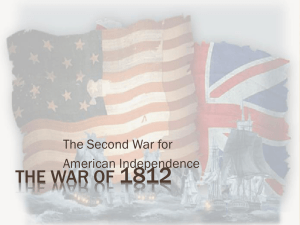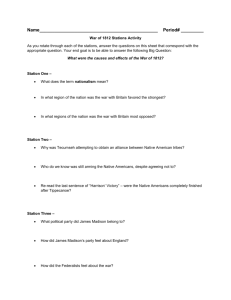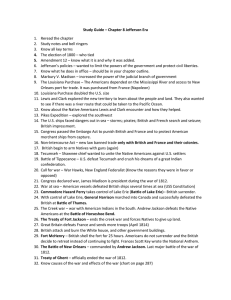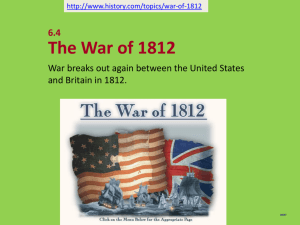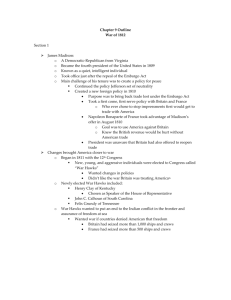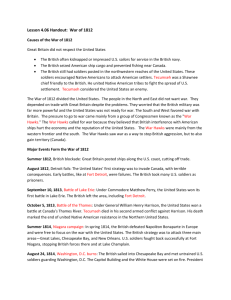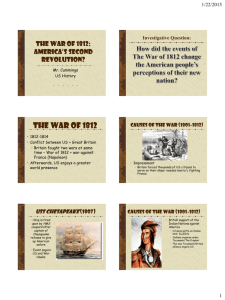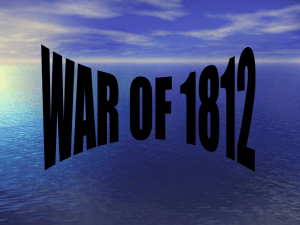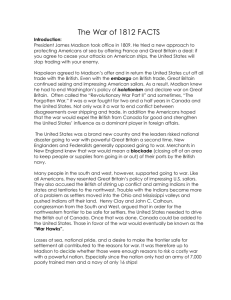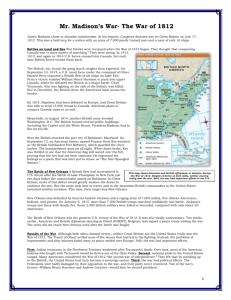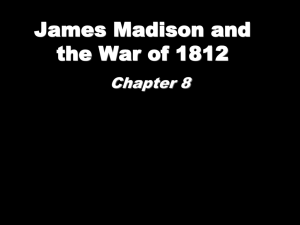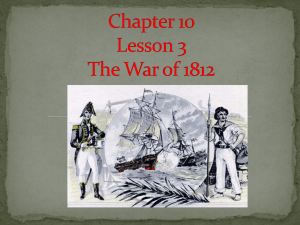War hawks
advertisement
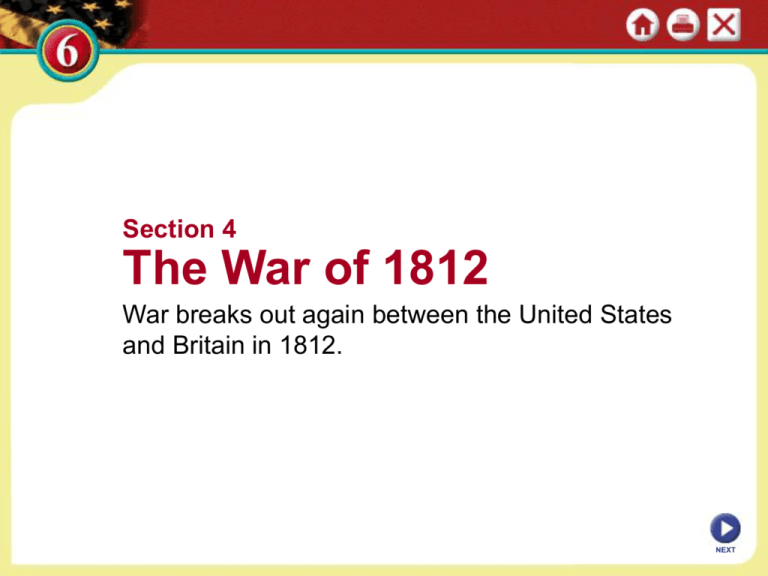
Section 4 The War of 1812 War breaks out again between the United States and Britain in 1812. NEXT SECTION 4 The War of 1812 The War Hawks Demand War British and French Rivalries • British blockade French ports to prevent ships from entering • Britain, France (1000, 500) seize American ships, confiscate cargoes Grievances Against Britain • Impressment—seizing Americans, drafting them into British navy • Federalist party (pro-Brit) shrinks in popularity • Chesapeake incident further angers Americans • Jefferson convinces Congress to declare embargo, or ban on exports • Embargo, meant to hurt Europe, also hurts U.S. - Congress lifts it, except with Britain, France Continued . . . NEXT The Chesapeake incident The actual number of Americans pressed into service in the Royal Navy is unknown, but it is estimated that a thousand American seamen per year were illegally pressed into British service. The British removed four “deserters” from the Chesapeake’s crew. Only one of them was British – the rest were American seamen who had been impressed into British naval service. The Leopard then sailed to England so that the men could be tried. SECTION 4 continued The War Hawks Demand War Tecumseh’s Confederacy • William Henry Harrison (Gov. of Indiana territory) makes land deal with Native American chiefs • Shawnee chief Tecumseh tries to form Native American confederacy: - tells people to return to traditional beliefs, practices - presses Harrison to leave land, negotiates British help; many tribes don’t join The War Hawks • Harrison is hero of Battle of Tippecanoe but suffers heavy losses • Broke Tecumseh’s plans for unity • War hawks—want war with Britain because natives used British arms --Henry Clay of Kentucky leads the War Hawks NEXT SECTION 4 The War Brings Mixed Results Americans’ Advantages • Canadian population still strongly French • British have to send troop reinforcements 3000 miles across the stormy Atlantic • British worn out from recent wars with France and Spain • American ships strongest in the world, manned by skilled sailors --Most famous ship, the Constitution, named because Paul Revere did the metalwork American Disadvantages • Northeast against the war, contributes little and even helps the British at times • Old and incompetent war generals Continued . . . NEXT SECTION 4 The War Brings Mixed Results The War in Canada • Madison (wins landslide presidential election of 1808..Dem-Rep.) chooses war, thinks Britain is crippling U.S. trade, economy • U.S. army unprepared; early British victories in Detroit, Montreal • Oliver Hazard Perry defeats British on Lake Erie; U.S. wins battles on Atlantic Ocean • Native Americans fight on both sides; Tecumseh killed in battle • British blockade U.S. ports along east coast Election of 1812 • Madison defeats Federalist, anti-war candidate DeWitt Clinton (mayor of NY) • Sectional results: Madison wins South and westContinued . . . NEXT SECTION 4 continued The War Brings Mixed Results British Burn the White House • By 1814, British raid, burn towns along Atlantic coast • British burn Washington D.C. The Battle of New Orleans • General Andrew Jackson fights Native Americans, gains national fame • Jackson defeats Native Americans at Battle of Horseshoe Bend - destroys military power of Native Americans in South • In 1815, defeats superior British force at Battle of New Orleans (the Yorktown of War of 1812) Continued . . . NEXT British burn Washington D.C. and the White House The individual states, while eager to defend themselves, felt no obligation to defend D.C. This was the only time in history that D.C. was occupied. President Madison and the rest of the government was forced to flee to Virginia. The British set fire to the Capitol building and other public buildings. The Executive Mansion was painted white to hide some of the effects of the fire and it has since been known as the White House. SECTION 4 continued The War Brings Mixed Results The Treaty of Ghent • Treaty of Ghent, peace agreement signed Christmas 1814 • Declares armistice or end to fighting; does not resolve all issues • 1815, commercial treaty reopens trade between Britain and U.S. • 1817, Rush-Bagot agreement limits war ships on Great Lakes • 1818, northern boundary of Louisiana Territory set at 49th parallel • Agree to jointly occupy Oregon Territory for 10 years NEXT Battle of Fort McHenry During a night-long bombardment of Fort McHenry, an American lawyer was on one of the ships trying to negotiate the release of an aged physician, a friend of his who was captured in Washington. He spent an anxious night wondering if Fort McHenry would be forced to surrender. When the dawn was breaking, the old doctor kept asking “Is the flag still there?”. Inspired Key wrote a poem “The Defense of Fort McHenry”. It was noted that the words could be made to fit an old drinking song called “To Anacreon in Heaven”, and the poem sung in this fashion became the “Star Spangled Banner”
